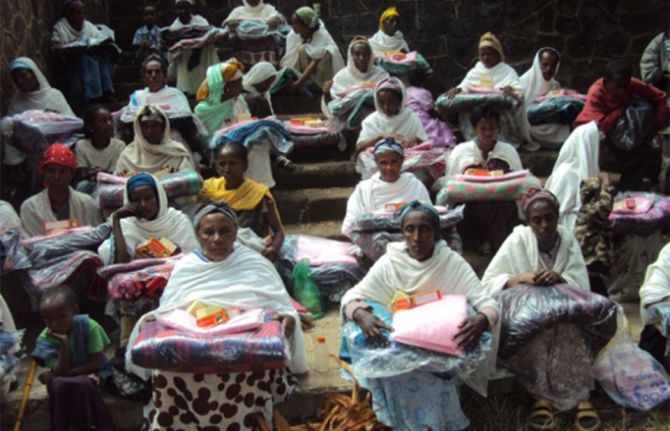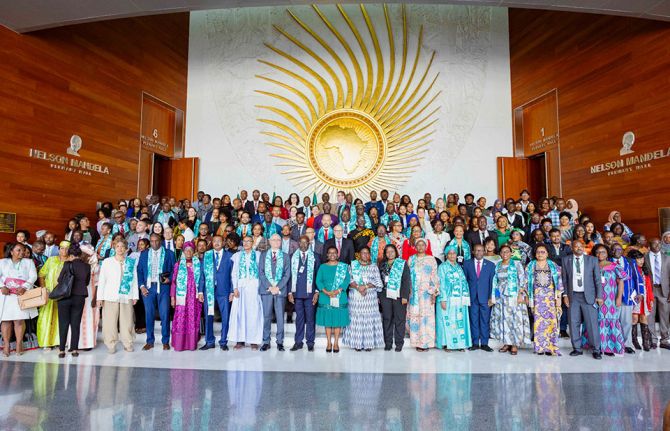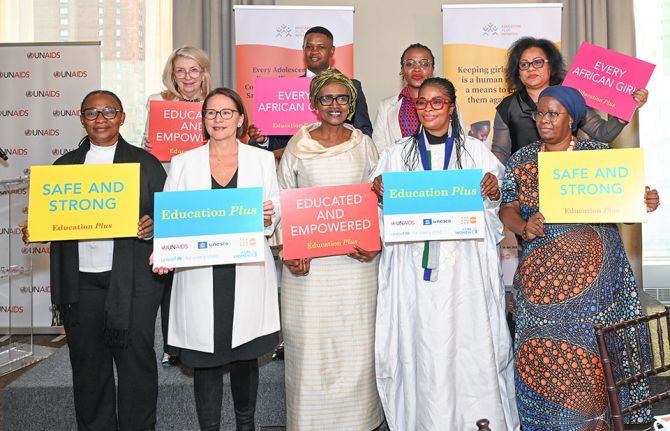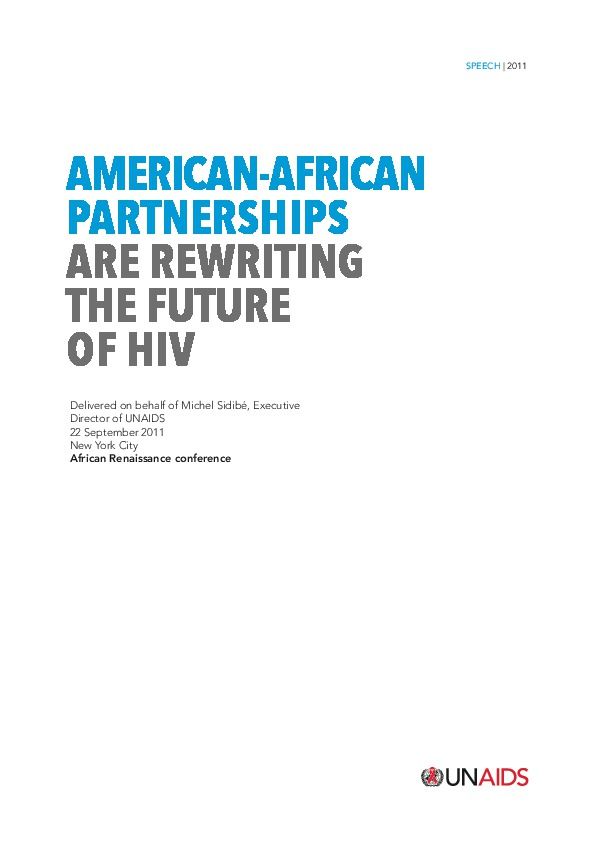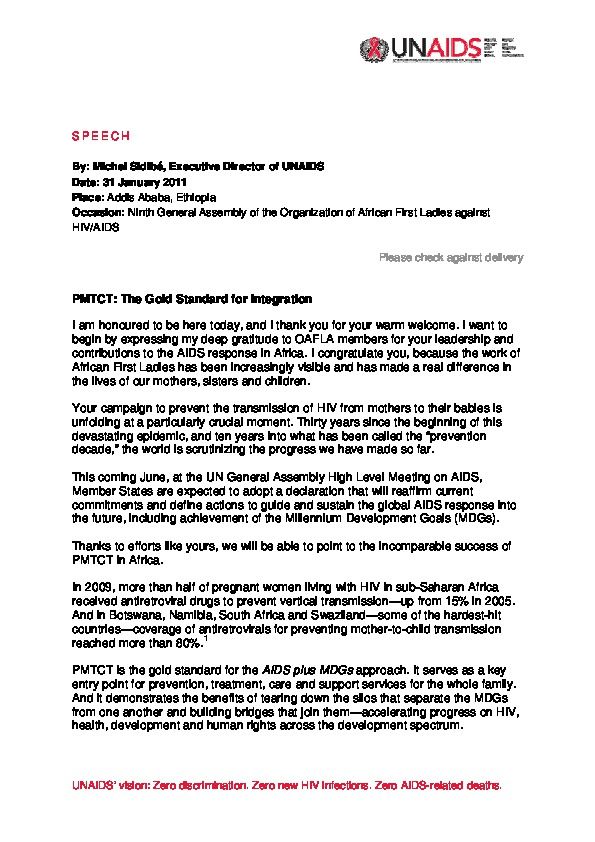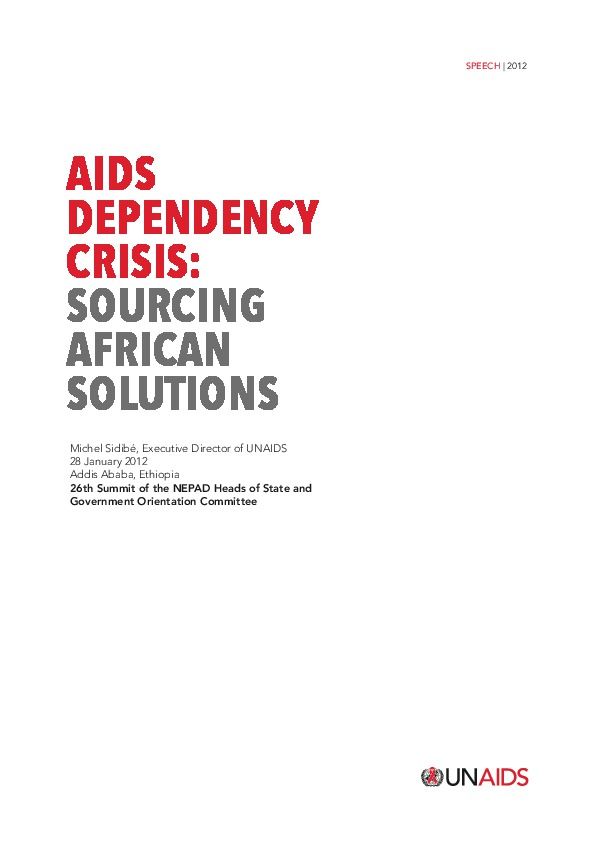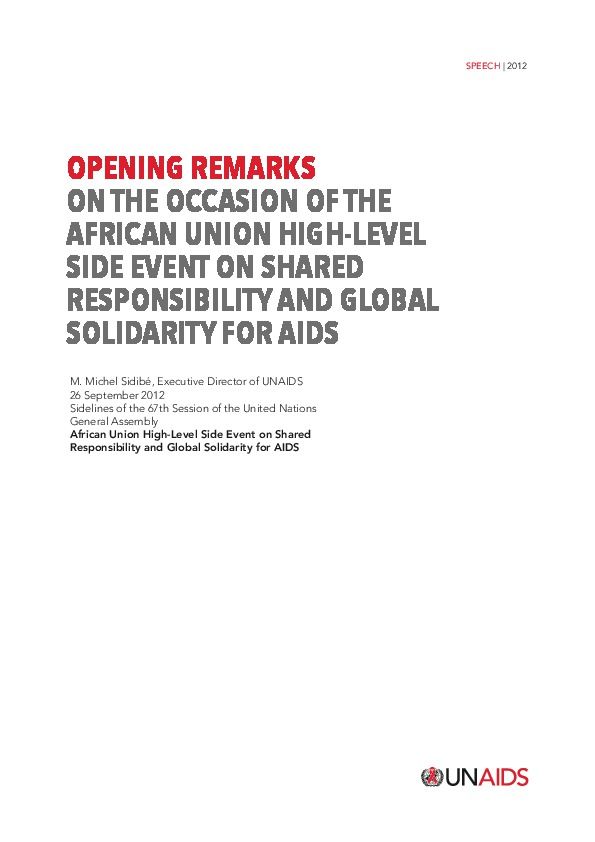
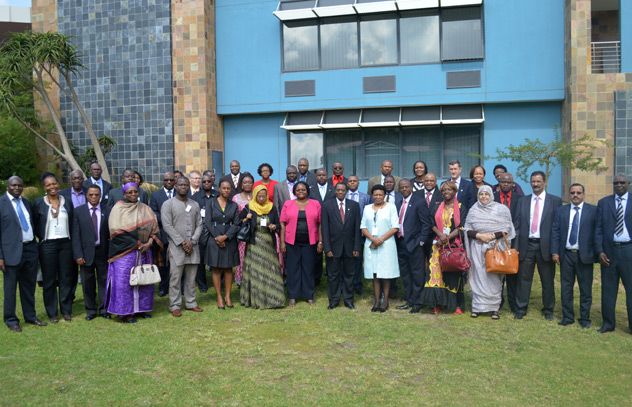
Participants of the Pan-African Parliament roundtable.
Debrief
African Parliamentarians call ending AIDS to be priority in the post-2015 agenda
27 March 2014
27 March 2014 27 March 2014The special role of parliamentarians in advancing the AIDS response now and beyond 2015 was discussed on 25-26 March during a roundtable at the Pan-African Parliament in Midrand, South Africa.
The meeting was organized by the African Union Commission (AUC) in collaboration with the NEPAD Agency, and in partnership with the Pan-African Parliament (PAP) with support from UNAIDS and Global Fund.
The aim of the dialogue was to create awareness and build the capacity of parliamentarians on the agreed 2013 Abuja actions toward the elimination of AIDS, TB & Malaria in Africa by 2030, the Roadmap on shared responsibility and global solidarity for HIV/AIDS, TB and Malaria, and the AU Manufacturing Plan for Africa (PMPA) including the African medicine regulatory harmonization (AMRH) initiative.
Participants recognized the comparative advantage that Members of Parliament have to follow through the implementation of policies and legislative frameworks.
Participants:
Members of Parliament from the continent representing national, regional and the Pan-African parliaments; representatives from the African Union Commission, NEPAD Agency, the African Peer Review Mechanism, the Global Fund to fight AIDS, Tuberculosis and Malaria, UNIDO, Pharmaceutical Manufacturers Association and the Africa Civil Society Platform.
Key Outcomes:
Parliamentarians committed to:
- Advocate for and engage with national stakeholders to ensure that ending AIDS, TB and Malaria epidemics remains a key priority in the national, continental and global agenda beyond 2015.
- Gather data on access to health services by vulnerable and key populations as well as to review laws and policies that affect access to services.
- Support the initiative to achieve universal access to HIV treatment on the continent, including HIV treatment for children, as an important catalyst for saving lives, preventing new HIV infections and moving towards ending the AIDS, TB and Malaria epidemics.
Quotes
“We, Pan-African Parliamentarians, commit to give priority to AIDS, TB and Malaria in the post-2015 development agenda, and improving human rights protection and promotion of people living with HIV and key populations.”
“We rely on you, Honourable Members, to use your parliamentary platforms at the national, regional and continental levels for advocacy, oversight and accountability on issues on the health agenda.”
“We are coming up with great recommendations but more important is the need to translate these into action and implementation to improve the welfare of our constituents.”
“UNAIDS is committed to supporting parliamentarians with the relevant strategic information on the AIDS epidemic as well as other tools to assist parliamentarians make decisions and provide oversight for the AIDS response.”
Related

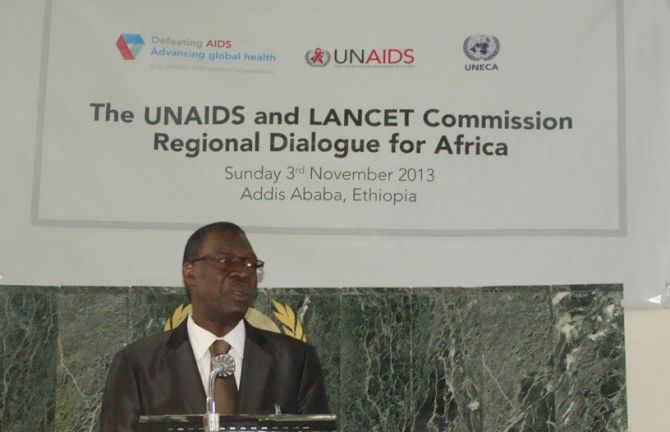
Mr Assane Diop, Director of Social Development policy division and Special Advisor to the Executive Secretary, UNECA
Feature Story
UNAIDS-Lancet Commission African dialogue calls for ending AIDS to be central to the post-2015 agenda
04 November 2013
04 November 2013 04 November 2013The first of a series in regional dialogues organized by the UNAIDS and Lancet Commission: Defeating AIDS - Advancing global health was held on 3 November in Addis Ababa. One of the main messages that emerged from the consultation was the need to include ambitious and measurable targets towards ending AIDS in the post-2015 development agenda.
Co-convened by the United Nations Economic Commission for Africa (UNECA) and UNAIDS, the Africa-focused dialogue was held on the margins of the Africa Regional Consultative Meeting on the Sustainable Development Goals. The aim of the consultation was to stimulate debate on how to ensure that the achievements of the AIDS response are carried forward to the new development agenda that is currently being worked on to replace the Millennium Development Goals when they expire in 2015.
Participants included officials from the African Union Commission, Regional Economic Communities, Ministers, Ambassadors, African Members of Parliament, as well as representatives of civil society, including networks of people living with HIV, young people, the private sector, and the UN system and other international organizations.
Over the coming weeks, additional regional dialogues are planned, including for Latin America (18 November), Asia-Pacific (19 November), Southern Africa (7 December) and Eastern Europe-Central Asia (13 December). The outcomes of these dialogues will help inform the recommendations of the UNAIDS and Lancet Commission to be presented in early 2014.
Quotes
Although AIDS remains the leading cause of death in Africa, recent dramatic scientific advances convince me that we can end AIDS in Africa. To realize this aim, I call on Africa to ensure a prominent position of AIDS in the next global development framework.
Ending AIDS is a critical element of Africa’s vision for the sustainable development goals – it will require shared responsibility and global solidarity and even more inclusive approaches.
I am from the generation that never experienced a world without HIV. It is my dream to see how the world feels without AIDS.
Related


UNAIDS Deputy Executive Director, Programme, Luiz Loures speaking at the opening of the First International Federation of Gynecology and Obstetrics (FIGO) Africa Regional Conference. Addis Ababa, Ethiopia, 2 October 2013. Credit: UNAIDS
Feature Story
Women’s health communities critical to reducing maternal and child mortality in Africa
05 October 2013
05 October 2013 05 October 2013Obstetricians and gynecologists, ministers, public health specialists and civil society organizations convened in Addis Ababa, Ethiopia from 2-5 October at the First International Federation of Gynecology and Obstetrics (FIGO) Africa Regional Conference to discuss ways of improving maternal and child health in Africa.
Speaking at the opening, UNAIDS Deputy Executive Director, Programme, Luiz Loures highlighted the link between HIV and maternal and child health. He called for women’s health and HIV communities to closely work together to increase access to life-saving health services to reach the most marginalized in society. He also stressed the need to uphold the sexual and reproductive rights of women living with HIV.
In sub-Saharan Africa, women are more likely to be living with HIV than men, accounting for 58% of the 22.1 million adults who were living with HIV in the region in 2012. Young women are particularly at risk of HIV infection–– around 28% of all new adult HIV infections in sub-Saharan Africa are among young women between the ages of 15-24. HIV is also a leading cause of death among women of reproductive age and has a major impact on child health and mortality, mainly through the transmission of HIV from mother to child.
Dr Loures congratulated FIGO on its visionary and bold work on women’s sexual and reproductive rights. He also underscored UNAIDS commitment to strengthening its collaboration with FIGO to raise political visibility and engage women’s networks on HIV and sexual and reproductive rights issues to reduce AIDS related maternal and child mortality.
Quotes
Human rights must be at the centre of our practice as everyone has a right to live. Our primary commitment as physicians is to save lives.
FIGO looks forward to active collaboration with UNAIDS to ensure the protection of the rights of women living with HIV regarding access to their services in the health sector.
Ethiopia has made excellent progress towards achieving the millennium development goals on maternal and child health and we are grateful for the assistance from our partners, such as FIGO and UNAIDS.
Related links
Related links

Press Release
New report shows that a healthier Africa will further boost economic growth on the continent
15 July 2013 15 July 2013ABUJA, Nigeria, 15 July 2013—A report launched today at the Special Summit of the African Union on HIV/AIDS, Tuberculosis and Malaria highlights increased, targeted health spending as an essential foundation to greater economic growth and development in Africa. The report, Abuja +12: Shaping the future of health in Africa, published by the African Union (AU) and the Joint United Nations Programme on HIV/AIDS (UNAIDS), reviews progress made since the AU’s 2001 Abuja Declaration—in which leaders pledged to mobilize domestic and international resources for health and remove barriers to the AIDS response—highlights remaining gaps, and prioritizes next steps.
“Africa’s health and our prosperity are inextricably linked. 2001 was a turning point for Africa as African countries committed to take greater responsibility for the health and wellbeing of their citizens,” said Dr Mustapha Sidiki Kaloko, AU Commissioner for Social Affairs. “Since then, we have invested greater resources and efforts to address AIDS, TB and malaria which has produced exceptional results. We urge all AU member states to commemorate Abuja+12 with a renewed commitment to prioritize health and achieve their commitments and targets by 2015.”
The new report highlights five main recommendations for a healthier Africa: unifying leadership, generating innovative financing, making smarter investments in health, strengthening human resources and ensuring no one is left behind. Together, these recommendations aim to leverage health as a force for economic growth and social progress across Africa.
The report also highlights recent successes in the HIV, TB and malaria responses in Africa, including substantial reductions in the number of new HIV and TB infections and deaths from malaria. There is now much broader access to antiretroviral and TB medications and use of malaria control strategies such as insecticide-treated bed nets and indoor residual spraying are becoming more widespread.
“Twelve years ago, African leaders pledged to unite in addressing the health crises which were devastating the continent—and succeeded in making historic progress,” said Michel Sidibé, Executive Director of UNAIDS. “A renewed and bold commitment here in Abuja is essential as drawing from experiences in the AIDS response, we know that smart investments will save lives, create jobs, reinvigorate communities and further boost economic growth in Africa.”
The report cites a number of approaches pioneered as part of the AIDS response that can help improve returns on health investments. These include using investment frameworks to prioritize spending on the most cost-effective interventions; focusing efforts on people most in need; and reducing front-line health care costs by shifting tasks, where appropriate, from physicians to nurses, community health workers or other health practitioners. On strengthening health governance in Africa, the report notes that the principles that have been fundamental to the success of the AIDS response can be leveraged for the post-2015 agenda to advance coordination, innovation and commitment.
A central element of the 2001 Abuja Declaration was the commitment to allocate at least 15% of public expenditures to health by 2015. Over the last five years, health spending in Africa has risen by about 10% annually. However, spending is still nowhere near where it needs to be—just six AU member states (Liberia, Madagascar, Malawi, Rwanda, Togo, and Zambia) have achieved the 15% Abuja target, and an additional US$ 31 billion is required to close the funding gap.
Contact
UNAIDS AbujaJeanne Seck
tel. +221 77 56 50 235
seckj@unaids.org
UNAIDS Geneva
Sophie Barton-Knott
tel. +41 22 791 1697
bartonknotts@unaids.org
Publications
Publications
Press centre
Download the printable version (PDF)

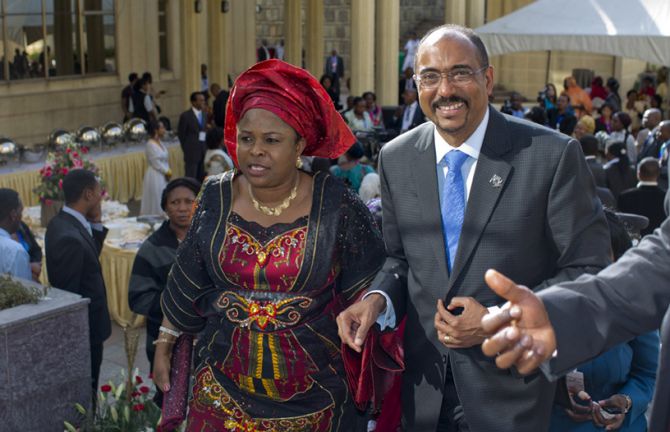
UNAIDS Executive Director, Michel Sidibé leaving Organisation of African First Ladies against HIV and AIDS 10 year anniversary celebration with First Lady of Nigeria, Patience Jonathan on 28 January 2013. UNAIDS/J.Ose
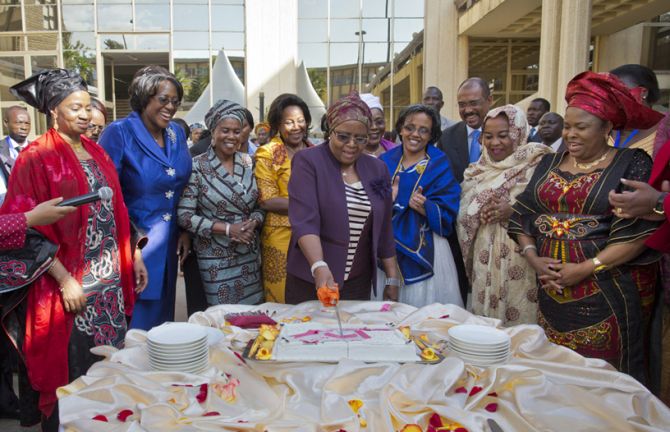
President of OAFLA and First Lady of Namibia, Penehupifo Pohamba, cutting anniversary cake with other First Ladies and UNAIDS Executive Director, Michel Sidibé on 28 January 2013. UNAIDS/J.Ose
Feature Story
African First Ladies come together to mark a decade of work in the AIDS response
29 January 2013
29 January 2013 29 January 2013The Organization of African First Ladies against HIV/AIDS (OAFLA) came together on 28 January to mark its 10-year anniversary and held its annual Extra Ordinary General Assembly on the side-lines of the African Union Summit in Addis Ababa, Ethiopia. UNAIDS Executive Director Michel Sidibé attended the anniversary luncheon and congratulated the organization for its contribution to the AIDS response.
OAFLA was established in 2002 by 37 First Ladies from Africa committed to take action against AIDS and improve the lives of women, young people and children. Women account for 58% of people living with HIV in sub-Saharan Africa.
The First Ladies of Africa, together with national partners have launched many high impact campaigns, including ‘FLAME’ which kicked off in 2011 in nine countries to promote the virtual elimination of new HIV infections among children and keeping their mothers alive.
Led by the First Lady of Namibia, Penehupifo Pohamba, OAFLA currently has 40 First Ladies from the continent as signatories to the organization.
Quotes
As we are celebrating, we are as well commemorating the decade of a long story, where millions of lives were lost, families destroyed and nations shaken. This is a celebration of hope for a new era and a new generation, which will be free of the HIV virus among new born babies.
First Ladies have influenced the political dialogue in their countries with excellent results. Few can ever have the impact of OAFLA and we count you as a critical partner today and the future.
Related

Press Release
African Union adopts new roadmap to accelerate progress in HIV, TB and malaria responses
16 July 2012 16 July 2012
AU and NEPAD Agency take the lead in transforming the face of health responses in Africa
ADDIS ABABA, 16 July 2012—A roadmap adopted today by African Heads of State and Government charts a new course for the continent’s responses to AIDS, tuberculosis (TB) and malaria. Developed by the African Union Commission (AUC) and the NEPAD Planning and Coordinating Agency (NEPAD Agency), with support from UNAIDS, the Roadmap on Shared Responsibility and Global Solidarity was endorsed at the 19th Summit of the African Union in Addis Ababa, Ethiopia.
“This Roadmap provides a major step forward in our responses to AIDS, TB and malaria,” said Dr Thomas Yayi Boni, Chairperson of African Union and President of Benin. “Through it, we will pursue African solutions reflecting our continent’s dynamism and potential—like local pharmaceutical production. Together we will invest in the future.”
Structured around three strategic pillars—health governance, diversified financing and access to medicines—the Roadmap offers a set of practical and African-owned solutions to enhance sustainable responses to AIDS, TB and malaria. It defines goals, expected results, roles and responsibilities to hold stakeholders accountable over a three-year time frame, through 2015.
“This Roadmap will act as a driving force for Africa-owned solutions,” said Dr Ibrahim Mayaki, Chief Executive Officer of NEPAD Agency. “Together we must support African leaders to implement it—that means new partnerships, new financing arrangements and new ways to strengthen sustainable African institutions.”
Health governance
The Roadmap emphasizes the importance of robust policy, oversight and accountability frameworks for investments in AIDS, TB and malaria. AIDS Watch Africa—an African advocacy and accountability initiative—will play a key role in measuring progress and holding national, regional, continental and global stakeholders accountable to their commitments on AIDS, TB and malaria.
“AIDS Watch Africa’s vision of shared responsibility and global solidarity marks a radical departure from business as usual,” said UNAIDS Executive Director Michel Sidibé. “I urge all African leaders to urgently take the Roadmap forward and all development partners to get behind these African efforts in the spirit of solidarity and mutual accountability.”
Diversified financing
According to UNAIDS estimates, Africa will require an annual investment of US$ 11-12 billion for its AIDS response in 2015; that same year, the expected funding gap is US$ 3-4 billion. Similarly, resources available for the continent’s TB and malaria responses fall far short of need.
The Roadmap calls on African governments and development partners to fill these funding gaps together, investing their “fair share” based on ability and prior commitments. Countries are encouraged to develop financially viable national plans with clear targets. Development partners are asked to provide long-term, predictable resources and to align their commitments with African priorities.
"Effective fund mobilization and disbursement are critical for our response," said Mr Idriss Déby Itno, President of the Republic of Chad. “This Roadmap should be a roadmap for each Head of State. We must consider this an opportunity to change our approach not just to AIDS but to the development of our Continent.”
Access to medicines
Many African countries depend on external sources to provide life-saving medicines for their populations. In the case of AIDS, more than 80% of HIV drugs dispensed in Africa are imported. A vast majority of HIV medicines keeping Africans alive are paid for through external aid.
The Roadmap establishes a set of priority actions to accelerate access to affordable and quality-assured medicines in Africa. These include: strengthening African drug regulatory systems; ensuring that countries in Africa acquire essential health-related technologies and commodities through South-South cooperation; and removing trade barriers to allow for the emergence of pharmaceutical production hubs within Africa that can serve regional markets.
AU Chair calls for side event on AIDS and shared responsibility
During the Summit of the African Union, Dr Yayi Boni called on African leaders to hold a high-level side event at the September 2012 UN General Assembly focused on AIDS and shared responsibility. Such an event would offer a unique opportunity to present the Roadmap to the global community, he said.
Documents
American-African partnerships are rewriting the future of HIV: African Renaissance conference, New York
22 September 2011
The partnerships being built between Africa and the Diaspora can make a big difference in two key dimensions: forging closer ties between America and Africa, and promoting sustainable human development. The AIDS movement is looking to American leaders forging partnerships with Africa to help us build momentum. As university presidents, elected officials and leaders in the arts, culture and civil society, we need you to play key roles in helping us reach the Millennium Development Goals by 2015, and ultimately, UNAIDS’ vision of the "three zeroes."
Documents
Ninth General Assembly of the Organization of African First Ladies against HIV/AIDS, Addis Ababa, Ethiopia
31 January 2011
I am honoured to be here today, and I thank you for your warm welcome. I want to begin by expressing my deep gratitude to OAFLA members for your leadership and contributions to the AIDS response in Africa. I congratulate you, because the work of African First Ladies has been increasingly visible and has made a real difference in the lives of our mothers, sisters and children.
Documents
"AIDS Dependency Crisis: Sourcing African Solutions": UNAIDS Executive Director’s speech to NEPAD Heads of State and Government Orientation Committee
28 January 2012
National leaders have made progress on AIDS a defining legacy of their commitment to their own people. But Africa is too dependent on external resources, especially for the AIDS response. It is time for African leaders to come together to define a transformed development paradigm that will deliver a new, socially sustainable agenda that is written and owned by Africa.
Documents
Opening remarks by UNAIDS Executive Director Michel Sidibé on the occasion of the African Union High-Level Side Event on Shared Responsibility and Global Solidarity for AIDS
26 September 2012




